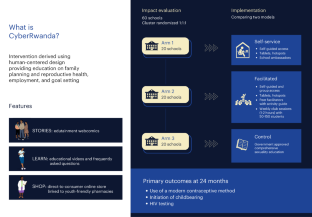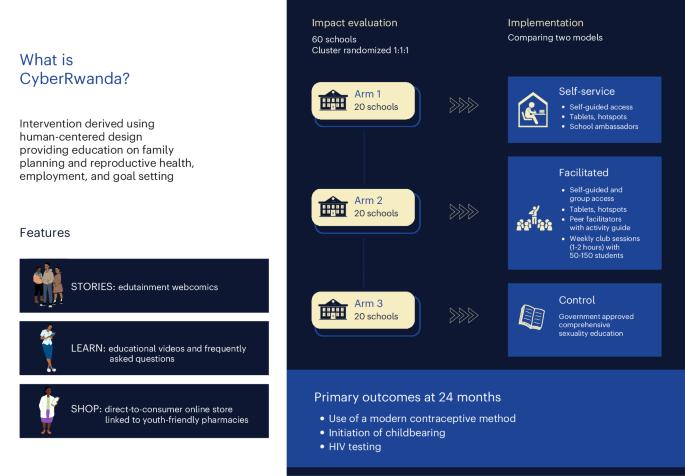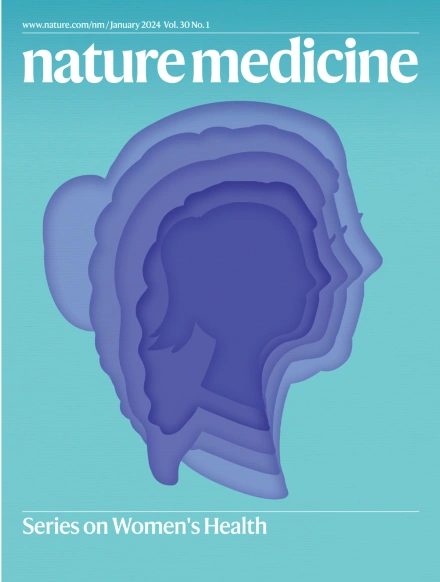数字校本干预对卢旺达青少年计划生育和生殖健康的影响:分组随机试验
IF 58.7
1区 医学
Q1 BIOCHEMISTRY & MOLECULAR BIOLOGY
引用次数: 0
摘要
我们对 "网络卢旺达"(CyberRwanda)进行了分组随机混合效果实施研究,这是一项针对卢旺达青少年的数字化计划生育和生殖健康干预措施。我们将 60 所学校按 1:1:1 的比例随机分配到对照组或两种实施模式中的一种--自助服务模式(在平板电脑上自助访问)或协助模式(同伴引导的俱乐部加平板电脑访问),没有任何掩盖。符合条件的参与者年龄在 12-19 岁之间,就读于中学一、二年级,并愿意提供同意书或协助/家长同意书以及后续联系信息。2021 年,随机抽取的 6078 名青少年参加了这项研究。24个月后,91.3%的参与者被保留下来并纳入主要意向治疗分析(对照组,n = 1 845;自助组,n = 1 849;协助组,n = 1 858)。该研究未发生任何不良事件。在全部样本中,"网络卢旺达 "并未影响现代避孕药具使用率(流行率 (PR) = 1.04;95% 置信区间 (CI) = 0.76,1.42)、生育率(PR = 1.33;95% CI = 0.71,2.50)和艾滋病毒检测率(PR = 1.00;95% CI = 0.91,1.11)等主要结果。在对性生活活跃的参与者进行的预设分析中,观察到网络卢旺达促进组的现代避孕药具使用率显著提高,这表明随着更多的研究对象性生活活跃,对避孕药具的需求增加,需要进行更长期的评估以检查效果。ClinicalTrials.gov 注册:NCT04198272。本文章由计算机程序翻译,如有差异,请以英文原文为准。


Effect of a digital school-based intervention on adolescent family planning and reproductive health in Rwanda: a cluster-randomized trial
We conducted a cluster-randomized hybrid effectiveness-implementation study of CyberRwanda, a digital family planning and reproductive health intervention for Rwandan adolescents. Sixty schools were randomized 1:1:1 to control or to one of two implementation models—self-service (self-guided access on tablets) or facilitated (peer-led clubs plus tablet access) with no masking. Eligible participants were aged 12–19 years, in secondary school levels 1 or 2, and willing to provide consent or assent/parental consent and contact information for follow-up. In 2021, 6,078 randomly selected adolescents were enrolled. At 24 months, 91.3% of participants were retained and included in the primary intention-to-treat analyses (control, n = 1,845; self-service, n = 1,849 and facilitated, n = 1,858). There were no adverse events related to the study. CyberRwanda did not affect the primary outcomes of modern contraceptive use (prevalence ratio (PR) = 1.04; 95% confidence interval (CI) = 0.76, 1.42), childbearing (PR = 1.33; 95% CI = 0.71, 2.50) and HIV testing (PR = 1.00; 95% CI = 0.91, 1.11) in the full sample. Significantly higher modern contraceptive use observed in the CyberRwanda facilitated arm in a prespecified analysis of sexually active participants suggests that longer-term evaluation is needed to examine effects as more of the study population becomes sexually active and has increased demand for contraception. ClinicalTrials.gov registration: NCT04198272 . An implementation trial conducted across 60 schools in Rwanda found that CyberRwanda, a digital, school-based intervention, did not affect the primary outcomes of modern contraceptive use, childbearing and HIV testing among adolescents but was associated with higher contraceptive use among sexually active participants.
求助全文
通过发布文献求助,成功后即可免费获取论文全文。
去求助
来源期刊

Nature Medicine
医学-生化与分子生物学
CiteScore
100.90
自引率
0.70%
发文量
525
审稿时长
1 months
期刊介绍:
Nature Medicine is a monthly journal publishing original peer-reviewed research in all areas of medicine. The publication focuses on originality, timeliness, interdisciplinary interest, and the impact on improving human health. In addition to research articles, Nature Medicine also publishes commissioned content such as News, Reviews, and Perspectives. This content aims to provide context for the latest advances in translational and clinical research, reaching a wide audience of M.D. and Ph.D. readers. All editorial decisions for the journal are made by a team of full-time professional editors.
Nature Medicine consider all types of clinical research, including:
-Case-reports and small case series
-Clinical trials, whether phase 1, 2, 3 or 4
-Observational studies
-Meta-analyses
-Biomarker studies
-Public and global health studies
Nature Medicine is also committed to facilitating communication between translational and clinical researchers. As such, we consider “hybrid” studies with preclinical and translational findings reported alongside data from clinical studies.
 求助内容:
求助内容: 应助结果提醒方式:
应助结果提醒方式:


